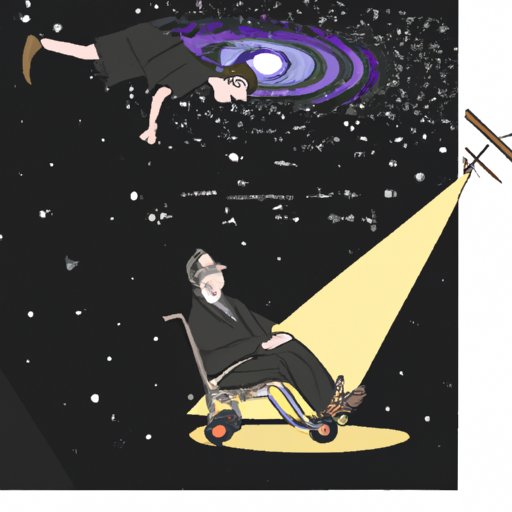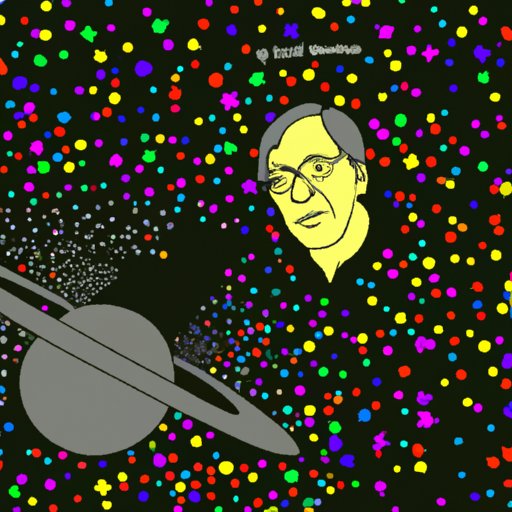Introduction
Stephen Hawking was one of the world’s most renowned physicists and cosmologists. Known for his pioneering work in theoretical physics and quantum mechanics, Hawking made groundbreaking discoveries that changed the way we understand the universe. He was a passionate advocate for science and was committed to making science accessible to everyone. In this article, we explore the life and legacy of Stephen Hawking and look at some of his major contributions to science.
An Overview of Stephen Hawking’s Contributions to Science
Stephen Hawking was an acclaimed scientist who made incredible contributions to physics and cosmology. He first made a name for himself with his discovery of Hawking radiation, which is a type of radiation emitted by black holes. He then went on to develop the theory of black holes and their properties, as well as exploring the universe through cosmology. Here we examine some of the key contributions he made to science.
Introduction to Hawking Radiation
In 1974, Stephen Hawking made a groundbreaking discovery when he proposed the theory of Hawking radiation. This radiation is emitted by black holes and is believed to be caused by quantum effects near the event horizon. Hawking argued that particles could escape from a black hole due to the process of “quantum tunneling.” This theory revolutionized the way we think about black holes and has since been accepted as one of the most important discoveries in modern physics.
Developing the Theory of Black Holes
Hawking’s work on black holes didn’t end with the introduction of Hawking radiation. He continued to develop his theories on black holes, arguing that they could emit radiation and eventually evaporate. He also argued that black holes have no hair, meaning that they can only be characterized by three parameters: mass, charge, and angular momentum. These theories were revolutionary at the time and are now accepted as fundamental principles of modern physics.
Exploring the Universe Through Cosmology
Hawking was also heavily involved in exploring the universe through cosmology. He worked on developing theories on the origin and evolution of galaxies, as well as the early universe and its structure. He also studied the nature of time and space, and explored the concept of multiple universes. His work in cosmology has been instrumental in shaping our understanding of the universe.
Examining Stephen Hawking’s Theory of Black Holes
Stephen Hawking’s theories on black holes revolutionized the way we think about these mysterious objects. His work began with the introduction of Hawking radiation, but he went on to develop more complex theories on the behavior of black holes. Here we take a closer look at the implications of Hawking’s work on black holes.
Overview of the Theories of General Relativity
Before Stephen Hawking, the prevailing theories on black holes were based on Albert Einstein’s theories of general relativity. According to these theories, black holes were objects with immense gravitational pull, so powerful that even light could not escape. Hawking’s theories challenged this view, arguing that black holes could emit radiation and eventually evaporate.
The Implications of Hawking’s Work on Black Holes
Hawking’s work on black holes had far-reaching implications for our understanding of the universe. His theories showed that black holes are not immutable objects, but rather dynamic phenomena that can evolve over time. This opened up new possibilities for studying the behavior of black holes and the implications of their existence.
Exploring the Impact of Stephen Hawking’s Work on Cosmology
Stephen Hawking’s work on cosmology was just as influential as his work on black holes. He helped establish the Big Bang theory, which states that the universe began with a single, massive explosion. He also developed theories on the origin and evolution of galaxies, as well as the structure of the early universe. Here we explore how Hawking’s work shaped our understanding of the cosmos.
Establishing the Big Bang Theory
Hawking played an important role in establishing the Big Bang theory, which is widely accepted as the best explanation for the origin of the universe. He developed mathematical models to support the theory and argued that the universe began with a single, massive explosion. This work was instrumental in solidifying the Big Bang theory as the dominant model of the universe.
Understanding the Origin and Evolution of Galaxies
Hawking also worked on understanding the origin and evolution of galaxies. He argued that galaxies form due to the gravitational attraction between matter, and that they evolve over time as the universe expands. His work provided a detailed picture of galaxy formation and evolution and has been instrumental in our understanding of the universe.
How Stephen Hawking Changed Our Understanding of the Universe
Stephen Hawking’s work on cosmology and black holes has had a huge impact on our understanding of the universe. He explored the nature of time and space, and examined the concept of multiple universes. His work has revolutionized our understanding of the cosmos and has opened up new possibilities for exploration.
Explaining the Nature of Time and Space
Hawking was particularly interested in exploring the nature of time and space. He developed theories on the curvature of spacetime, as well as its expansion and contraction. He also explored the concept of “cosmic inflation,” which is the idea that the universe is expanding at an accelerating rate. His work has shed light on the nature of time and space and has given us a better understanding of the universe.
Examining the Concept of Multiple Universes
Hawking also explored the concept of multiple universes, or the idea that there could be an infinite number of universes beyond our own. He argued that these universes could exist in different dimensions and that they could have different physical laws. His work on the concept of multiple universes has been instrumental in advancing our understanding of the cosmos.

The Legacy of Stephen Hawking and His Innovative Ideas
Stephen Hawking was a visionary scientist who left behind a lasting legacy. His innovative ideas and groundbreaking discoveries have changed the way we think about the universe. Here we look at how his work has influenced modern physics and what his legacy means for the future of science.
Applying Hawking’s Principles to Modern Physics
Hawking’s work has had a profound influence on modern physics. His theories on black holes and cosmology have been applied to a wide range of fields, including astrophysics, quantum mechanics, and string theory. His work has revolutionized the way we think about the universe and has opened up new avenues of exploration.
Appreciating the Impact of Hawking’s Work on Our Understanding of the Universe
Stephen Hawking’s work has changed our understanding of the universe and has enabled us to explore the cosmos in ways that were previously unimaginable. His groundbreaking discoveries and innovative ideas have revolutionized modern physics and have helped shape our understanding of the universe. We owe him a great debt for his incredible contributions to science.

The Life and Achievements of Stephen Hawking
Stephen Hawking was born in Oxford, England in 1942. He was a brilliant student and attended the University of Oxford, where he studied physics and mathematics. After graduating, he went on to pursue a PhD at Cambridge University, where he developed his theories on black holes and cosmology.
Overview of His Life and Career
Stephen Hawking was a passionate advocate for science and was committed to making science accessible to everyone. He wrote several popular books, including A Brief History of Time and The Universe in a Nutshell, which introduced complex scientific concepts to a wider audience. He also appeared in numerous television shows and documentaries, helping to bring science to the masses.
Examining His Major Achievements
Stephen Hawking’s major achievements include his discovery of Hawking radiation, his development of the theory of black holes, and his exploration of the universe through cosmology. He was also awarded the Presidential Medal of Freedom in 2009 and the Special Fundamental Physics Prize in 2013. His legacy lives on in the form of his groundbreaking discoveries and innovative ideas.

The Influence of Stephen Hawking on Modern Physics
Stephen Hawking’s influence on modern physics cannot be overstated. His work on black holes and cosmology has revolutionized the way we think about the universe and has opened up new possibilities for exploration. Here we examine how his work has impacted modern physics.
Development of Theoretical Physics and Quantum Mechanics
Hawking’s work on theoretical physics and quantum mechanics has been integral to our understanding of the universe. He developed mathematical models to explain the behavior of black holes and used them to develop theories on the origin and evolution of galaxies. His work has been instrumental in advancing our knowledge of the cosmos.
Exploring the Nature of Gravity and Spacetime
Hawking also explored the nature of gravity and spacetime. He developed theories on the curvature of spacetime and argued that it could expand and contract. His work has enabled us to better understand the nature of gravity and has given us a deeper insight into the structure of the universe.
Conclusion
Stephen Hawking was one of the most influential scientists of our time. His groundbreaking discoveries and innovative ideas revolutionized modern physics and changed the way we think about the universe. His work on black holes and cosmology has been instrumental in advancing our understanding of the cosmos, and his legacy will live on for generations to come.
(Note: Is this article not meeting your expectations? Do you have knowledge or insights to share? Unlock new opportunities and expand your reach by joining our authors team. Click Registration to join us and share your expertise with our readers.)
